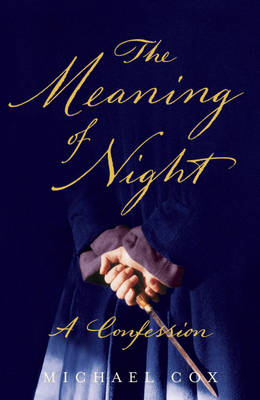
A cold October night, 1854. In a dark passageway, an innocent man is stabbed to death. So begins the extraordinary story of Edward Glyver, book lover, scholar and murderer. As a young boy, Glyver always believed he was destined for greatness. This seems the stuff of dreams, until a chance discovery convinces Glyver that he was right: greatness does await him, along with immense wealth and influence. And he will stop at nothing to win back a prize that he now knows is rightfully his. Glyver's path leads him from the depths of Victorian London, with its foggy streets, brothels and opium dens, to Evenwood, one of England's most enchanting country houses. His is a story of betrayal and treachery, of death and delusion, of ruthless obsession and ambition. And at every turn, driving Glyver irresistibly onwards, is his deadly rival: the poet-criminal Phoebus Rainsford Daunt. Thirty years in the writing, The Meaning of Night is a stunning achievement. Full of drama and passion, it is an enthralling novel that will captivate readers right up to its final thrilling revelation.
The Meaning of Night: A Confession begins with Edward Glyver killing a red-headed man. He doesn't know the man; he ends his life simply to make sure he's capable of killing his nemesis when the time comes. It's an interesting start to the novel, because it makes it difficult right from the beginning to elicit any sympathy for Edward. After dispatching the red-headed man, Edward spends the rest of the book explaining what brought him to this point, and all the wrongs that his nemesis has heaped upon him.
Usually I love books about revenge. Some of my favorites - The Count of Monte Cristo, The Prestige - are well-crafted, compelling vengeance tales. The Meaning of Night, however, misses the mark in a few respects. To begin with, it's about 200 pages too long. By the time I hit page 500, I started to feel annoyed that Edward was still whining about all the terrible things that happened to him. I wanted some action, some movement forward, something.
Secondly, Edward royally screws everything up by "falling in love" with a woman, and as is often the case in Victorian-era stories, he falls in love with her simply by looking at her. They haven't even spoken two words to each other before he announces to the reader that he is now forever her captive. Edmond Dantès certainly never let such stupidity get in the way of his vengeance.
However, Edward Glyver isn't Edmond Dantès, and that does make The Meaning of Night an interesting read. Edward is far from a trustworthy narrator. He's arrogant, short-sighted, and is so fixated on his nemesis that the reader starts to wonder, is Phoebus Daunt really responsible for everything Edward says he is? Or is Edward simply mentally unstable and paranoid?
Overall, I enjoyed this novel and its lush Victorian setting, although it would have benefited from a shorter length and less stupidity on the narrator's part.
Reading updates
-
Started reading
-
1 August, 2007:
Finished reading
-
1 August, 2007:
Reviewed
